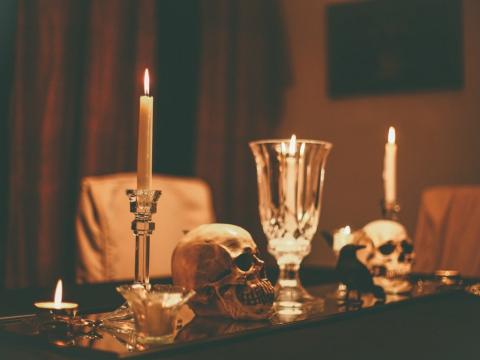Name the Poet Quiz
This reclusive poet wrote of death:
"Because I could not stop for Death—
He kindly stopped for me—
The Carriage held but just Ourselves—
And Immortality"- Read Part Four: Time and Eternity (XXVII)
He wrote a poem that really isn't about ice cream:
"Call the roller of big cigars,
The muscular one, and bid him whip
In kitchen cups concupiscent curds."- Read The Emperor of Ice-Cream
Whose apocalyptic vision described:
"Mere anarchy is loosed upon the world,
The blood-dimmed tide is loosed, and everywhere
The ceremony of innocence is drowned;
The best lack all convictions, while the worst
Are full of passionate intensity."- Read Yeats' The Second Coming
Who wrote the following lines about a snowy evening?
"The woods are lovely, dark and deep.
But I have promises to keep,
And miles to go before I sleep,
And miles to go before I sleep,"- Read Stopping by Woods on a Snowy Evening
He ended his most famous poem with this plea:
"Ah, love, let us be true
To one another! for the world, which seems
To lie before us like a land of dreams,
So various, so beautiful, so new,
Hath really neither joy, nor love, nor light,
Nor certitude, nor peace, nor help for pain;
And we are here as on a darkling plain
Swept with confused alarms of struggle and flight,
Where ignorant armies clash by night."- Read Dover Beach
This romantic poet was inspired by a vision:
"In Xanadu did Kubla Khan
A stately pleasure-dome decree:
Where Alph, the sacred river, ran
Through caverns measureless to man
Down to a sunless sea"- Read Kubla Khan: or, a Vision in a Dream
Which 18th-century poet wrote this to a mouse?
"Wee, sleekit, cowrin, tim'rous beastie,
O, what a panic's in thy breastie!
Thou need na start awa sae hasty,
Wi' bickering brattle!
I wad be laith to rin an' chase thee,
Wi' murdering pattle!"- Robert Burns is Scotland's most famous poet. His birthday (Jan. 25) is widely celebrated in England, Scotland, and Newfoundland as Burns' Night. Read To a Mouse
This poet wondered if he dared to eat a peach:
"I have heard the mermaids singing, each to each
I do not think that they will sing to me.
I have seen them riding seaward on the waves
Combing the white hair of the waves blown back
When the wind blows the water white and black.
We have lingered in the chambers of the sea
By sea-girls wreathed with seaweed red and brown
Till human voices wake us, and we drown."- Read all of Eliot's The Love Song of J. Alfred Prufrock
This poet, illustrator, and mystic framed these immortal lines:
"When the stars threw down their spears,
And watered heaven with their tears,
Did he smile his work to see?
Did he who made the Lamb make thee?"- Blake (1757-1827) received no formal education except in art and earned a modest living as an engraver.Read The Tiger
Bonus Question
This favorite of Queen Elizabeth wrote the following response to an ardent shepherd:
"If all the world and love were young,
And truth in every shepherd's tongue,
These pretty pleasures might me move
To live with thee and be thy love."- Raleigh's The Nymph's Reply to the Shepherd responded to Christopher Marlowe's The Passionate Shepherd to His Love. A century later Andrew Marvell took up the theme again with To His Coy Mistress. Read The Passionate Shepherd to His Love ("Come live with me and be my love . . .") The Nymph's Reply to the Shepherd To His Coy Mistress
Which Harlem Renaissance poet asked:
"What happens to a dream deferred?
Does it dry up
like a raisin in the sun?
Or fester like a sore—"- Read Harlem (a dream deferred)





